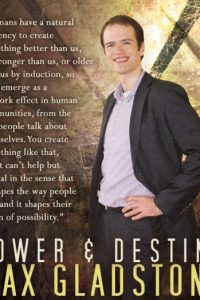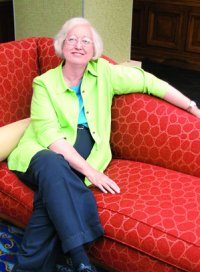Andy Duncan: The Nature of Belief

Andrew Robert Duncan was born September 21, 1964 in Columbia SC. He earned a BA in journalism from the University of South Carolina in 1986, and worked as a reporter and editor for seven years. He entered North Carolina State University’s graduate English program, studying under John Kessel and earning his MA in 1995. He attended Clarion West in 1994, and received his MFA in fiction from the University of Alabama in Tuscaloosa in 2000.
Duncan’s debut collection, Beluthahatchie and Other Stories, appeared in 2000, and won the World Fantasy Award. Second collection The Pottawatomie Giant and Other Stories appeared in early 2012. New collection An Agent of Utopia is out from Small Beer Press in November 2018.
Duncan taught undergraduate English for eight years, first at NC State University and then the University of Alabama. He was senior editor at trucking magazine Overdrive for five years, leaving in 2008 for a tenure-track job in the English department at Frostburg State University in Frostburg MD, where he lives with his wife Sydney.
Excerpts from the interview:
“Wakulla Springs started years ago when Ellen Klages came up to me at the International Conference on the Fantastic in the Arts and said, ‘I love you, and I love your work. I think we are kindred spirits. I need some advice. I have this mass of research. I’ve been putting it together for years. I’m no longer sure why. It all seems to hang together to me, but that may just be my imagination. I don’t know whether there’s a story there. Could I send you the material? Would you look at it?’ This would be instantly attractive to any writer, because rather than work on our own stuff, we always love to immerse ourselves in somebody else’s stuff and advise them. So I said, ‘Sure, send it to me.’
“I don’t know what I was expecting – maybe a couple of email files or something – but what arrived within a week or so at the house was this crate. A child could have been transported in it. I wrestled this great big box into the house and slit it open. There was no outline, no cover letter, no post-it notes, or any sort of guide. It was just a mystery box filled with hundreds and hundreds of pages of photocopied materials – articles, photographs, advertisements, flyers, what-have-you – in no order whatsoever. I started pulling it out, and it was like a fantastic voyage – like roaming through Ellen Klages’s mind. As I leafed through, themes emerged. There’s rather a lot on the flora and fauna, particularly the prehistoric flora and fauna, of Florida. There’s a lot on the filming of Creature from the Black Lagoon. There’s a lot on the history of Tarzan as a character. There’s a lot about race relations in the Jim Crow south. There’s a surprising amount about chimpanzees in popular culture in America in the 1950s. And so on and so forth. I was going through all of it with complete happiness.
“Not long after that, I saw Klages again at another event. She said, ‘Do you really think there’s a story in all that?’ I said, ‘Oh, hell yes, there’s a story, absolutely.’ We sat down by the pool and on a legal pad talked out the story that seemed to emerge from all this, and wrote it down, and I passed her the legal pad, and said, ‘Okay, you’re welcome. Now, when you win an award for this, just credit me, and thank me for the help in brainstorming it.’ She said, ‘Oh, no. You’re far too invested now. We’re already collaborating on this – we have to write this together.’ So sitting there, we divvied up the chapters – you know, ‘I’ll write this one, you’ll write this one.’ Then we went into what I call ‘abashed collaborator mode’ – which is, over the next couple of years, whenever we saw each other on the circuit, we did the usual, ‘Oh, hello,’ and we’d hug and embrace, and we’d chat and we’d hang with our friends, and then somewhere, like 20 minutes into it, one or the other of us would lean in and murmur, ‘Have you done anything on that thing?’ Person B would say, ‘No, I haven’t.’ Then person A would say, ‘Oh, thank God, I haven’t either.’ Then it would all be okay. Because we were not actually doing what we said we were going to do.
“Finally what got us out of that sad state of affairs and into actually working on it was that we spent money and time and were together for a week in Tallahassee FL. We said, ‘This is the only way this is ever going to actually happen.’ Our idea at the time (foolish youth) was that we were just going to sit there and bang out the copy and finish the thing by the end of the week. We were going to be C.L. Moore & Henry Kuttner – we were going to just sit there and do it. Like Leigh Brackett and Faulkner in that cottage at Warner Brothers.
“What actually happened was better than this fantasy, because we spent the whole week researching together and spending days at the Florida archives, where I got to handle the actual typewritten Zora Neale Hurston manuscripts for the WPA Guide, with all the folklore in it. We went all over the Wakulla Springs lodge, which is still there as it was in the ’40s and ’50s. We rode the tour boat and heard the spiel of the guide. We trespassed like hell all over the woods and swamps and sinkholes and cemeteries all around there, up and down dirt roads, and general stores, and things like that. So many people since have come up to us and said either that they are from that area and we really nailed it, or that they have never been there but they felt they had been, because the story is so tactile and immersive about the landscape and the climate. I really think that’s what made the story. The two of us were there, we actually saw the place, and we realized all the shadings of the story that we wanted to tell.
“Once we got back, even though we didn’t do our Kuttner & Moore thing in the suite, the writing just galloped along, comparatively. We’d had the shared experience and we were reading each other’s minds. Now it’s hard for us even to remember who wrote what. I wrote a long sequence in the gambling den, because I had charge of Levi, the boy, who’s the son of the young woman from chapter one, but that was just because I knew a lot of stuff about gambling dens in the day. I just knew I wanted to set a scene there, and I couldn’t figure out why, but I somehow got Levi into this place. When I sent her that chunk, I said, ‘I freely concede this was like naked research time for me, and I’m not sure it fits the story at all.’ I said, ‘If you think it doesn’t fit, just take it out, and I will make it the kernel of another story. Maybe it just belongs somewhere else.’ She said, ‘No, I like this. I’m going to work on it.’ When it came back to me, she had rewritten the whole thing – I mean, it was still mine, but she had threaded material throughout. I don’t think she changed my language – she just included all these references and characters and things like that, and just wove it into the whole narrative that we were telling. Now not only did it not look extraneous to me, it felt like an intrinsic part of the whole. I just admired that to no end – I really did. She’d done a great editing job.
“At the time, Tor.com had an absolute limit for the word count of stories they would publish. We had not considered Tor.com as a result, because the story was so long, like 35,000 words or something. We thought it was going to be a chapbook with a small press, but that fell through. Because it was Klages’s idea, she not only had final edit on it, she also had say in collaboration with me over where we sent it. She said, ‘You know, I’m just going to try Tor.com anyway.’ She emailed Patrick Nielsen Hayden and said, ‘Hey Patrick. Andy Duncan and I have finished this thing. It is twice as long as your maximum word count, and you’re probably not interested, but if you would like to see it, no one else has, and we will send it to you.’ Five minutes later, Patrick emailed and said, ‘Send it to me.’ A couple days later he bought it.”
Interview design by Francesca Myman. Photo by Liza Groen Trombi.
Read the full review in the November 2018 issue of Locus.
 While you are here, please take a moment to support Locus with a one-time or recurring donation. We rely on reader donations to keep the magazine and site going, and would like to keep the site paywall free, but WE NEED YOUR FINANCIAL SUPPORT to continue quality coverage of the science fiction and fantasy field.
While you are here, please take a moment to support Locus with a one-time or recurring donation. We rely on reader donations to keep the magazine and site going, and would like to keep the site paywall free, but WE NEED YOUR FINANCIAL SUPPORT to continue quality coverage of the science fiction and fantasy field.








